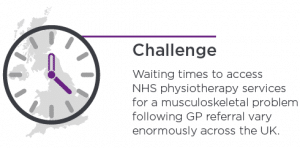Rapid access to physiotherapy by telephone leads to early assessment and self-management and, when appropriate, treatment and begins a shift to greater empowerment.
Richard Pell, Senior Service Transition Manager, and MSK Physiotherapist, talk about some common misconceptions of PhysioLine, the benefits of the service and the impact on waiting times.
Why the PhysioLine service is needed

Connect Health, working closely with commissioners, introduced physiotherapy assessment and early intervention by telephone (“PhysioLine”) back in 1999 and, having had nearly two decades of experience, have found it to be a successful method of addressing the delays in “right care”. With a standard for the PhysioLine consultation to take place within 48 hours of referral, the time to evidence-based advice is significantly reduced.
Evidence base grows
In 2016, The Medical Research Council (MRC) funded a PhysioDirect randomised control trial, with a total of 2252 patients that compared this approach with usual physiotherapy care. The conclusion was the PhysioDirect service was broadly acceptable to participants since it provided faster access to physiotherapy advice for their musculoskeletal conditions. Participants felt that it is best placed as one method of accessing physiotherapy services, in addition to, rather than as a replacement for, more traditional face-to-face physiotherapy assessment and treatment.
The benefits of PhysioLine
Our experience and evidence is that a physiotherapy telephone assessment with advice offered early in the course of a musculoskeletal problem, offers the following benefits.
Patient satisfaction
In 2016, Connect commissioned the University of Northumbria to carry out a retrospective, multi-centre study of EQ5D outcomes for more than 4,000 NHS patients receiving physiotherapy treatment from Connect. PhysioLine was part of the pathway for the vast majority of patients included in that study and the results showed that 68% of patients have significant quality of life improvement after a course of physiotherapy. An average improvement of +0.203 (compared to the average of previous studies of +0.16) was experienced – a statistically significant increase that demonstrates the value of reactive physiotherapy.
“The service is easy to contact and you can refer yourself. You are then contacted by a qualified person and don’t have to wait weeks for an appointment.”
PhysioLine patient
Commissioner satisfaction
It’s not only good for patients, it’s also good for the commissioner. PhysioLine is a triage service and more. Given the response in 48 hours this can fulfill needs for early triage in MSK services suggested to CCGs by NHSE.
Combined with self-referral, which Connect has also operated for many years, this is arguably the best form of “ First Point Contact” for MSK problems – assessment and advice by an experienced physiotherapist as an alternative to GP consultation thus relieving pressure on GP appointments meeting the needs of the “GP Forward View”.
Public Health England’s recent report found that patient self-referral assessments and advice by physiotherapists for musculoskeletal (MSK) conditions saves £19.30 per patient or £2.08 for every £1 spent.
Myths and misconceptions still exist
A common question is – how can you know what’s going on without seeing me?
- Expert clinical assessment is not just about physical tests. Verbal subjective history taking can identify a provisional diagnosis and management options as well as screening for any need for urgent intervention.
Another misconception is – this is just another 111 service.
- There is no script – ever. It’s not an algorithm-driven service. It’s bespoke and responsive to patient’s needs. We ask about the patient’s beliefs, expectations and fears. The biopsychosocial elements of care are key.
PhysioLine has proven to be a successful model and we will continue to enhance this service, including online applications, giving patients even more choice and convenience in how they access physiotherapy services and other resources to support self-care and management of long-term musculoskeletal health.



